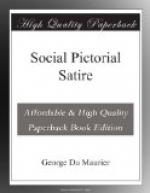All that was thirty years ago and more. I may say at once that I have reconsidered the opinion I formed of John Leech at that time. Leech, it is true, is by no means the one bright particular star, but he has recovered much of his lost first magnitude: if he shines more by what he has to say than by his manner of saying it, I have come to think that that is the best thing of the two to shine by, if you cannot shine by both; and I find that his manner was absolutely what it should have been for his purpose and his time—neither more nor less; he had so much to say and of a kind so delightful that I have no time to pick holes in his mode of expression, which at its best has satisfied far more discriminating experts than I; besides which, the methods of printing and engraving have wonderfully improved since his day. He drew straight on the wood block, with a lead-pencil; his delicate grey lines had to be translated into the uncompromising coarse black lines of printers’ ink—a ruinous process; and what his work lost in this way is only to be estimated by those who know. True, his mode of expression was not equal to Keene’s—I never knew any that was, in England, or even approached it—but that, as Mr. Rudyard Kipling says, is another story.
The story that I will tell now is that of my brief acquaintance with Leech, which began in 1860, and which I had not many opportunities of improving till I met him at Whitby in the autumn of 1864—a memorable autumn for me, since I used to forgather with him every day, and have long walks and talks with him—and dined with him once or twice at the lodgings where he was staying with his wife and son and daughter—all of whom are now dead. He was the most sympathetic, engaging, and attractive person I ever met; not funny at all in conversation, or ever wishing to be—except now and then for a capital story, which he told in perfection.
[Illustration: JOHN LEECH.]
The keynote of his character, socially, seemed to be self-effacement, high-bred courtesy, never-failing consideration for others. He was the most charming companion conceivable, having intimately known so many important and celebrated people, and liking to speak of them; but one would never have guessed from anything he ever looked or said that he had made a whole nation, male and female, gentle and simple, old and young, laugh as it had never laughed before or since for a quarter of a century. He was tall, thin, and graceful, extremely handsome, of the higher Irish type; with dark hair and whiskers and complexion, and very light greyish-blue eyes; but the expression of his face was habitually sad, even when he smiled. In dress, bearing, manner, and aspect, he was the very type of the well-bred English gentleman and man of the world and good society; I never met any one to beat him in that peculiar distinction of form, which, I think, has reached its highest European development in this country. I am told the Orientals are still our superiors in deportment. But the natural man in him was still the best. Thackeray and Sir John Millais, not bad judges, and men with many friends, have both said that they personally loved John Leech better than any man they ever knew.




